Drax power station has applied to the Planning Inspectorate for permission to replace its two remaining coal-fired units with much larger ones burning fossil (natural) gas. You can read the full response we’ve submitted to this here.
Drax power station has applied to the Planning Inspectorate for permission to replace its two remaining coal-fired units with much larger ones burning fossil (natural) gas. You can read the full response we’ve submitted to this here.
Greetings!
As some things slow down for the summer, we wanted to share a brief update, and a “hold the date” for Fuel Poverty Action’s coming AGM, which is scheduled for 13 September.
Help stop Drax:
Before that, however, can we draw your attention to the request for objections to Drax power station’s plans to create the UK’s largest gas-fired plant to date, at a time when fossil fuels must urgently be phased out. Biofuelwatch asked us to spread the word on this. This year’s extreme temperatures are now making summer another dangerous season, with heat waves as lethal as cold. There is also the danger of air conditioning – for those who can afford it – further increasing carbon emissions and causing a vicious spiral of climate change, cost, and deaths. Biofuelwatch’s tweets and a facebook post for sharing are below. They also have a model response to the consultation (deadline 29 August), and we have a draft ourselves if you’d like to see it.
FPA Update:
It’s been a very busy few months, pressing for
and at the same time, we have
Safe Cladding and Insulation Now!
For the last six months, however, the lion’s share of our energy has gone into starting the SCIN campaign for Safe Cladding and Insulation Now, following the appalling loss of life at Grenfell Tower. If you haven’t been seeing our mailings about this, have a quick skim of the website front page and News, and see more under “Cladding and Insulation” tab – including the Open Letter to the Secretary of State (for organisations, politicians, etc to sign), ways to affiliate, personal testimonies from people suffering cold or in fire-risk buildings, and model motions for trade unions and political parties. In the last few weeks we’ve been working with Grenfell United to back up residents of an estate in Salford which has the same cladding and insulation as Grenfell. We expect to deliver the Open Letter in October, with a demonstration/event.
Please see what you can do – for the sake of both the people who must go to sleep in buildings that could go up in flames, and the people who may end up freezing next winter, as many did last year, when cladding has been removed and not replaced. The dangerous state of UK homes, old and new, is a national disgrace and an emergency. No more residents should pay for this with their health or with their lives.
In fact, we welcome help of all sorts, from joining our core team to spreading the word on social media or helping on a one-off basis, eg organising events, or going door to door on housing estates. Just get in touch and let us know, or come along to our AGM, we’ll be very glad to meet you!
Meanwhile, FPA still has no funding! We rely on voluntary labour (lots!) but also on the generosity and determination of our friends. A “donate” button can be found on our website here. We have made time to do some funding applications. Offers of fundraising events are also very welcome, and a good way of spreading the word, as well — we’d be glad to help.
* * *
On Drax, please share:
https://twitter.com/biofuelwatch/status/1021706758107156480
https://www.facebook.com/Biofuelwatch/posts/2149840821754870
Hope to see you on 13 September – or to hear from you, before!
Fuel Poverty Action are glad to see the CMA’s recommendation for regulation of heat networks – which is long overdue – and the acknowledgment that while some customers benefit from District Heating, others are trapped with high prices and regular outages. With the government poised to release £320 million of public money for heat networks this autumn, consumer protection is urgent. As well as regulation, this protection must be built into low carbon planning requirements. And it must include protection from the common problem of overheating, summer and winter.
However, one outstanding issue does not seem to have been addressed, despite FPA specifically raising this with the CMA when they consulted us, and in our response to their Statement of Scope (a response they do refer to in relation to reliability): The huge demands on leaseholders for capital when a heating system is deemed to require further expenditure — often extending beyond repair to major extension or improvements.
Ruth London from Fuel Poverty Action said,
“Demands for tens of thousands of pounds each, on top of high standing charges for maintenance, go beyond what leaseholders can be expected to budget for and are not reasonable: freeholders and heat suppliers are in effect asking these individual householders to finance an infrastructure development in UK heating.
“This is similar to the demands being made on residents of tower blocks clad in the same combustible materials as Grenfell Tower, who are also being asked for five figure sums to remove and replace their own cladding. Here too, the materials chosen by developers were not chosen by residents, and they should not be asked to pay the cost for others mistakes or cost-cutting decisions. Many simply do not have the money to do so.”
The very weak legal position of leaseholders in the UK has recently been the subject of much debate in the media and in Parliament including a recent debate led by Leasehold Knowledge, with input from residents of many residents associations.
FPA have worked with leasehold residents in several estates who are fighting such demands in court, who would be ready to speak to the media.
One says,
“On my estate over 80% of leaseholders have moved out or now rent their flats and live elsewhere outside of London to pay the debt.”
Another says,
“Many of the leaseholders are pensioners and they are simply too old to move and organise renting out their dilapidated flats, the money will simply come from their food.”
The government published proposals for the ECO (Energy Company Obligation) scheme due to come to force in October 2018. FPA wrote with our concerns that the proposals, by excluding oil, risk the lives of rural residents. We also prompted a personal response from an oil customer in a rural home with no other realistic way to heat his family’s home. In August 2018 we learned that in a surprise change from their original consultation, BEIS have announced that they will continue to allow new oil boilers to be installed under ECO3 under the ‘Broken Boiler Cap’ (of 35,000 systems per year equivalent). BEIS expects that new oil boilers will be delivered mostly in rural areas. In addition, a 400% uplift will be available to provide support for the replacement of broken boilers (including oil-fired boilers) under the cap to low income, “vulnerable” and fuel poor households.
Read our letter to Claire Perry, the Minister of State for Energy and Clean Growth below:
Letter to BEIS on Oil and Fuel Poverty
Before the government conceded the principle by promising to “fully fund” the replacement of Grenfell-style cladding, FPA had collected over 60 signatures from MPs, community organisers, campaigners, trade unions, and resident associations on an open letter that demanded that the government release the money to make people safe and warm. Though the victory in £400 million cannot be understated, the money and promises don’t nearly go far enough in ensuring peoples’ homes are made safe from fire, nor does it promise vital guarantees to keep people warm over the winter when remediation works are underway and cladding and insulation is off. FPA spoke to many people left out in the cold and suffering in freezing homes last winter, whilst their insulation was off. Cold, like fire, kills.
FPA have redrafted their letter and sent it out to be signed. The new letter presses on a set of urgent demands that the government needs to meet and will be delivered to the Secretary for Housing, Communities and Local Government this October.
Please read and share.
Solidarity.
.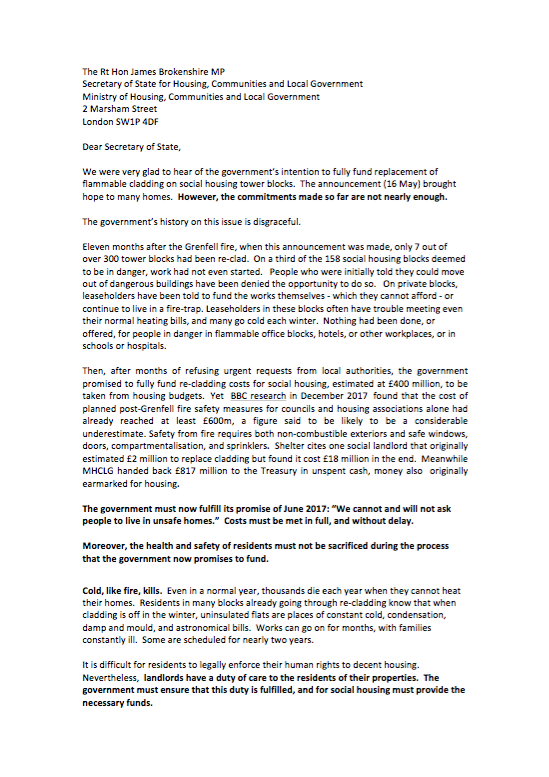
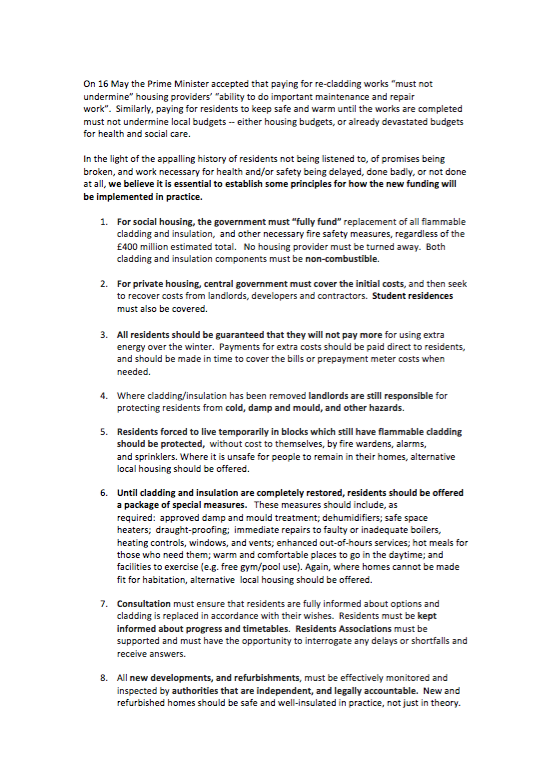

The Guardian have published FPA’s letter about housing safety post Grenfell. Read it here https://www.theguardian.com/uk-news/2018/jun/10/vital-questions-grenfell-inquiry-must-not-duck
On the anniversary of Grenfell, I have been asked to write this blog post describing what its like living in a high-rise building with dangerous cladding on it like Grenfell had. My name is Elizabeth and I live in a 22 story high rise housing association block in Salford, managed by Pendleton Together and owned by Salford council.
The block has flammable cladding. And a year on from the tragedy it still has the cladding on it except for the first three floors. And it’s been terrible living here since the tragic events for several reasons. Since the Grenfell fire me and several residents haven’t been able to sleep well and have been too scared to sleep, especially in the first few weeks. We were first promised that if anyone wanted to move they should just go to the Housing Association and they would look at our cases fairly. But unfortunately many residents, even the ones with kids on high floors and people with health problems and people with doctors letters recommending they are moved, have been denied a move. This has upset residents a lot since many kids and people with health problems died in Grenfell .
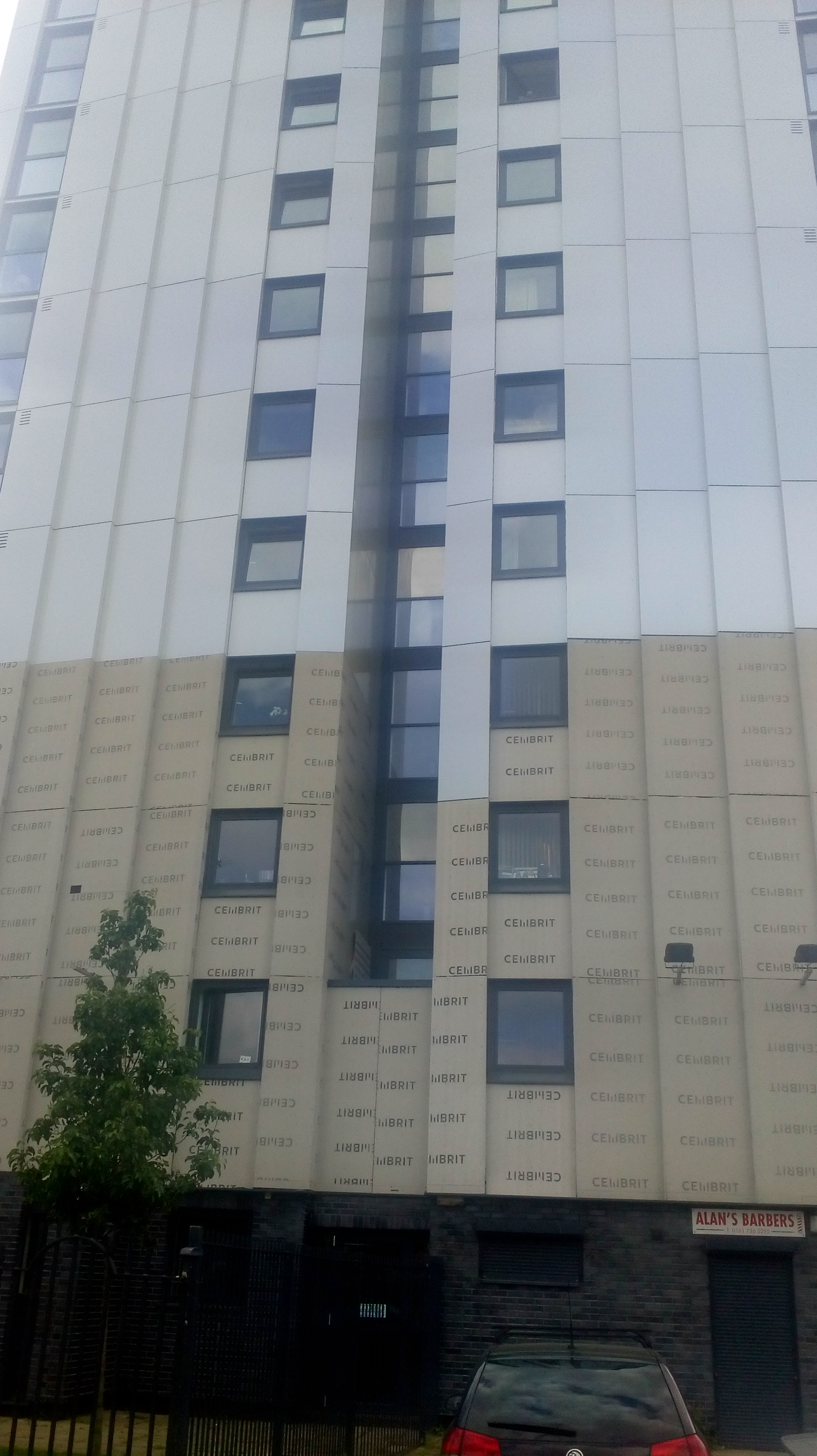
We have been told that removing the cladding is going to take two years and that they’re looking at installing sprinklers in the all the high rise blocks. A month after the Grenfell fire the mayor of Salford, Paul Dennett , said he would remove the cladding and that he wouldn’t wait for the report from the national and local government on testing whether the cladding that’s on our blocks is flammable like Grenfell. And that he would borrow £25 million pounds to get the cladding off and keep residents safe. Unfortunately, Pendleton Together only removed the first three rows, and a year later my block and many other blocks managed by Pendleton Together still have the major part of the cladding still on. Cladding only came off for the camera news crews and work stopped when the camera and TV news crews stopped filming.
There was a meeting I attended about a month after the Grenfell tragedy, which was held in Salford youth theatre, where the deputy mayor and other various speakers came to talk about Grenfell. When the meeting got heated the deputy mayor of Salford said we should be thankful he came, as he didn’t have to come to the meeting to let local residents know what the Salford Council was going to do about our unsafe home. He stated that the Salford council only had £25 million in its reserves, unlike Kensington and Chelsea, the council that the Grenfell Tower falls under.
In my block there is an internal fire alarm. When it goes off it only rings in the two exit stairwells which are located at both ends of the building, not the hallway, not the flats as it’s not connected to ring all the fire alarms to alert residents there is a fire in the building and to evacuate. The fire alarm is so quiet because the sound is coming from the stairwell. When it goes off, many residents don’t hear it. I and others have complained about that but nothing has been done.
We have had four fire alarms where residents had been told to evacuate the building and many residents were still inside with their kids and said they didn’t hear it. That’s no surprise since nobody lives in the stairwell. I slept through one fire alarm as I couldn’t hear it as I was sleeping and it’s too quiet. If you have the TV or music on you might not hear it, or if you’re sleeping.
Secondly we have no fire blankets or small fire extinguishers to put out small fires, like many flats have for safety.
Thirdly we have no Tenants Association due to the fact the housing association locked us out of the community room and said not enough people attend the meeting. We usually have between 5 and 10 people at our tenants meeting, but they said it’s not enough. So we can’t make an official complaint as the Tenants Association meeting as we aren’t official. It’s been like that for two years now. Our community room has never been open to the tenants officially, it’s been used by the cleaners and by other blocks for their meetings, which is very unfair.
If one tenant types a letter expressing the complaints of several tenants, the Housing Association will target the person whose address is on the letter and say that they’re the only one complaining. We have to put a resident’s address on the letters as a reply address, as the community room doesn’t have an address or letterbox, that was binned after the refurbishment
We were promised raised beds to grow vegetables and fruit since many residents are on low incomes. We were hoping to donate the vegetables and fruit to the food bank but that never materialized even though it was on the plans of the refurbishment of the block.
We also have very expensive heating system called the NIBE system , that many residents can’t afford and that other housing associations have had to rip out due to expensive bills that it causes for residents. Residents have complained about the NIBE but the Housing Association has just blamed the residents and said they haven’t use the NIBE properly.
The major refurbishment of our block included an electricity installation, and it’s caused many power surges that have tripped the electricity in my flat and others’ flats. My cooker which was only a year and half old tripped my electricity and cut all my electricity off in my flat due to a power surge. I called out the housing association, they sent an electrician who said it was my cooker. I then called the manufacturer who tested my cooker and said there was nothing wrong with it. My friend who lives in another flat also had problems with her cooker ever since the electricity refit. Her cooker is not working properly. We have never been offered any compensation and being unemployed I had to pay the bill just for the manufacturer to tell me there nothing wrong with my cooker.
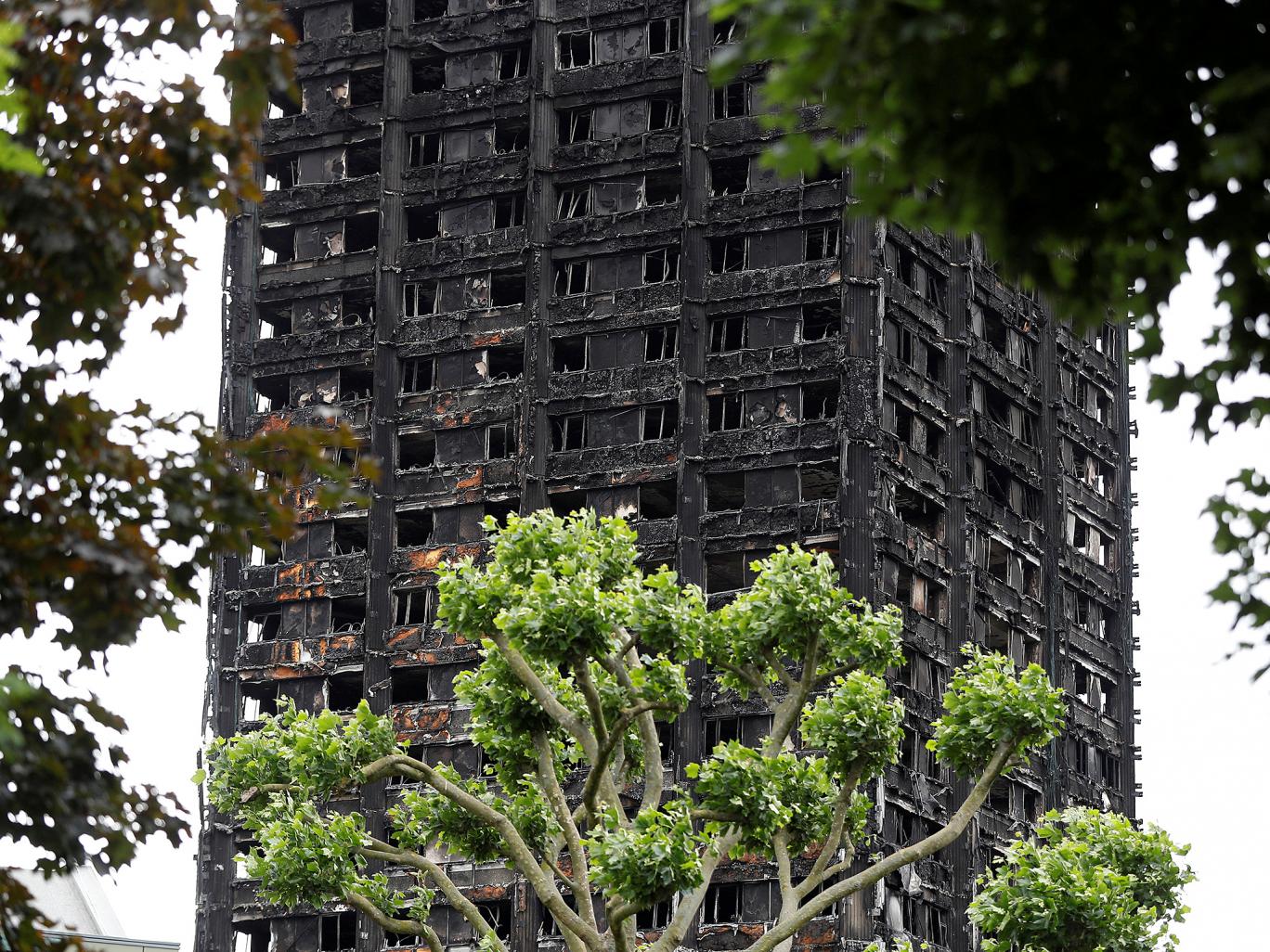
Grenfell residents and their blog was complaining about the power surge since their refurbishment. It’s really worrying that we having the same problem. As it’s strange for a fridge freezer to catch fire. Rumours are that it’s the electricity surges and the upgrade of the block that made the fridge catch fire. I can’t know for sure but I don’t believe that fridges randomly catch on fire .
After Grenfell I don’t trust the Tory Government , my local council or the Housing Association. It’s disgusting that a year after Grenfell many residents haven’t been rehoused. And that residents who live in high rises like Grenfell with this cladding are being ignored. Its stinks of class warfare to me. Our lives don’t matter in these austerity times.
The housing association lastly have put fire marshalls who are meant to walk the floors 24 hours a day, but many residents have complained that they are always downstairs on the ground floor and never seen walking the floors. If the fire alarm goes off they are meant to run up stairwells , go on each floor and alert residents to evacuate the building, but in practice they only seem to be on the second floor or on the ground floor when the fire alarm has sounded, which has made many residents feel unhappy and unsafe.
These are the reasons why many residents are unhappy living in these high rises, because their problems aren’t being addressed and they are being denied a move to safe accommodation.
You can join the ‘Safe Cladding and Insulation Now’ facebook group to share your story and hear from others here.
Full details of the Fuel Poverty action ‘Safe Cladding and Insulation Now’ campaign can be found in the Cladding & Insulation sections of our website.
Eleven months after promising to “keep our people safe”, the government has announced that they will “fully fund” replacement of cladding in social housing tower blocks. They estimate the cost at around £400 million. This is a huge achievement for those who have been pressing hard for this money, including Grenfell survivors, FPA and the many organisations and MPs supporting the demands of our SCIN campaign (Safe Cladding and Insulation Now!), and Local Authorities whose tower blocks are affected. But it’s nowhere near enough, and there are many unanswered questions, including, incredibly: will the new cladding also be flammable?
THURSDAY 17 MAY sees the launch of the second edition of FPA’s popular “Mini-Guide” to fuel customers’ rights in dealing with predatory energy suppliers. Now updated and expanded to include short sections on district heating and on landlords, the Mini-Guide is easy to read and down to earth, and it tells you what works — not what “should” happen.
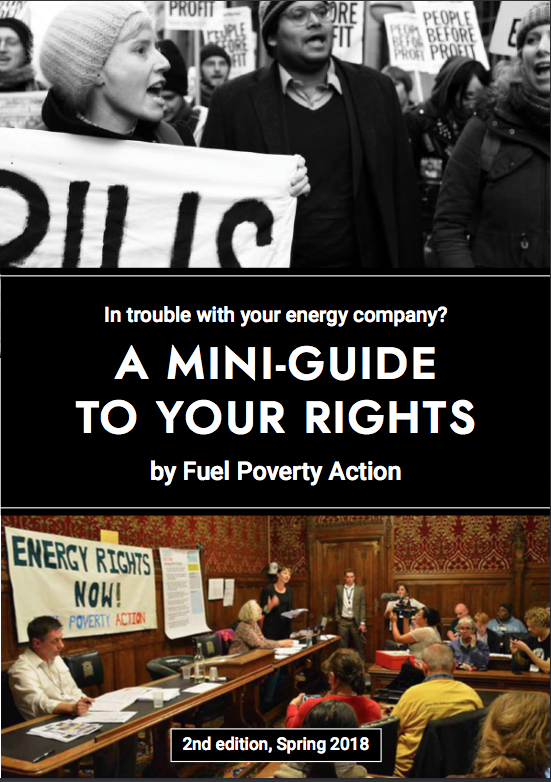
Please join us to pick up your free copy, consider who you know that might find it useful, and hear from experts on the value of good information:
There is no need to register but please try to let us know if you can make it.
7 – 9 pm
Thursday 17 May
Crossroads Women’s Centre, 25 Wolsey Mews London NW5 2DX (off Caversham Road)
Fully wheelchair accessible.
Tea and cakes.
This event will replace FPA’s regular monthly meeting but there will be time as well to discuss what is happening in our new post-Grenfell “SCIN” campaign for Safe Cladding and Insulation Now. SCIN is fighting for the people in high-rise blocks who’ve been left with flammable cladding, and for the others, who’ve had cladding removed, and will be freezing again next winter. There is growing support, and all sorts of possibilities!
TAKE ACTION! Sign our petition on change.org to call on Theresa May to fund replacement of Grenfell-style cladding. No more fires, no more cold.